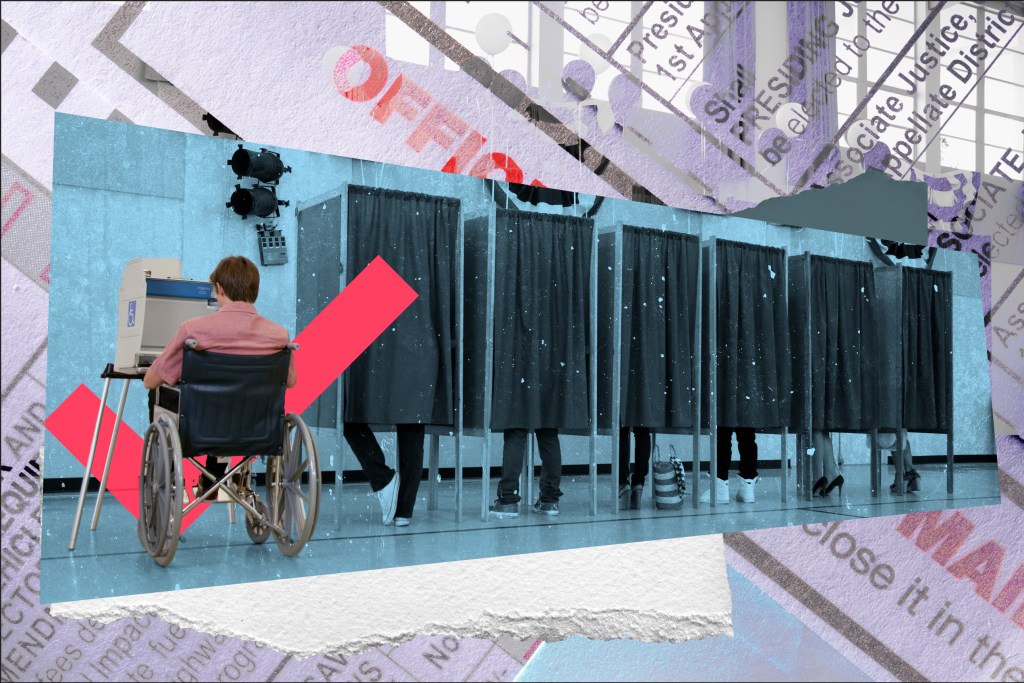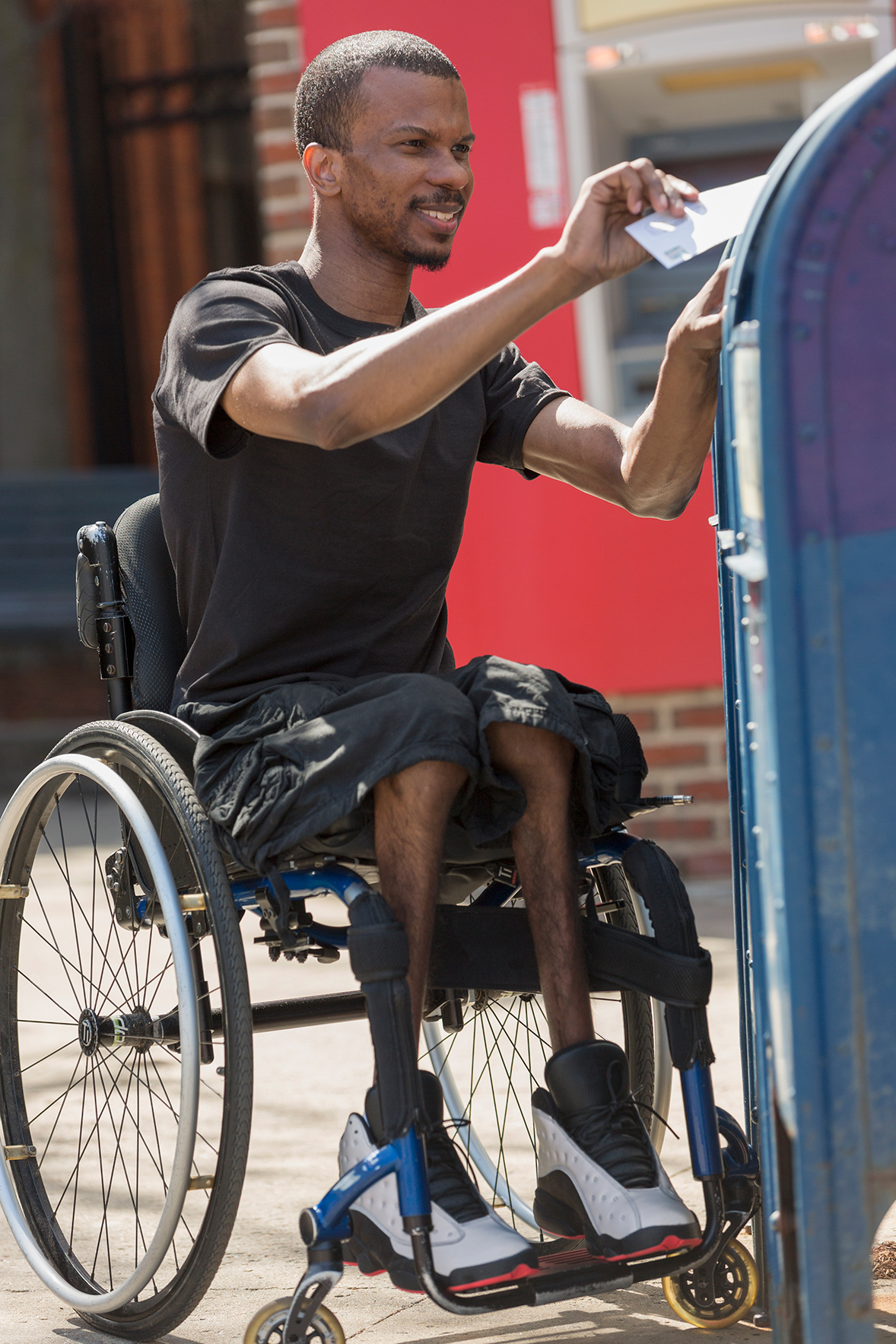
When Detroit Disability Power volunteers audited the city’s polling places for accessibility compliance in 2022, they found something troubling. They looked at four categories of accessibility required by law—accessible parking, accessible entrances, wheelchair-height voting booths, and accessible voting machines—and found that only 12% of the city’s polling places offered all four.
But that percentage doesn’t tell the whole story: Even when polling places had wheelchair-height voting booths, they often weren’t private. And when they had accessible voting machines, staff weren’t always trained in how to use them. When a quick trip to the polls becomes a 45-minute back-and-forth between staff members figuring out which buttons to press and cords to plug in, many disabled voters may decide that voting is simply not worth the hassle.
This isn’t just a Detroit issue, and this isn’t just a “disability issue.” This is a democracy issue. And it’s happening across the country.
For too long, we’ve seen issues of accessibility sidelined in voting-rights advocacy, or, worse, used in bad faith to shut down polling places that are already too few and far between.
There is a troubling history in our country of pitting accessibility against election integrity: if it’s easy to vote, the argument goes, then some of those votes must be illegitimate. This idea, of course, has been thoroughly and repeatedly debunked, but misinformation persists, and it acts as a barrier to meaningful change—making it harder for everyone to access their vote.
The impacts are significant. A 2022 survey by the U.S. Election Assistance Committee found disabled voters had difficulty voting or needed assistance at a rate three times higher than able-bodied voters. The survey estimated that if disabled voters had voted at the same rate as non-disabled voters, there would have been 2 million more votes cast in the 2020 election—which, it’s worth noting, was already far more accessible than typical elections because of pandemic-necessitated changes to early and mail-in voting.
Disabled voters represent a vulnerable constituency that has much to gain—and therefore to lose—at the ballot box. They do not exist in an identity vacuum: disabled voters are also voters of color, transgender voters, young voters, low-income voters, and voters who care about climate change and reproductive rights and the economy.
Their votes matter because of the diverse perspectives they represent; they are often intentionally suppressed for the same reason. “Voters with disabilities are the last constituency that can lose the right to vote based on their identity,” Michelle Bishop of the National Disability Rights Network shared with Ford, referring to both to voter suppression and the loss of voting rights that comes with entering into a guardianship. To deny disabled voters easy, equal access to the polls is to deny them access to their fundamental rights as Americans—to make their voices heard, to vote for people and policies that materially impact their lives, to participate in the project of our democracy.
And beyond the benefit for disabled voters, more accessible elections benefit us all. We saw this in 2020. Mail-in voting helps immunocompromised voters safely cast their ballots; it also helps busy parents who don’t have time to wait in line, college students away at school, and people who would just prefer to fill out their ballots thoughtfully and in their own time. Accessible voting machines help blind voters cast their ballots privately and independently; they can also easily be used by anyone else. Using more long-term care facilities as polling places would help residents vote easily and independently; they’re also more likely to be designed with wheelchair access in mind. Accessibility might matter most for disabled voters, but it makes a difference for everyone.

“Making the system work for everyone means having a menu of options. There will never be a one-size-fits-all, silver bullet voting solution.”
Michelle Bishop
“Making the system work for everyone means having a menu of options,” Michelle Bishop said. “There will never be a one-size-fits-all, silver bullet voting solution.”
At the Ford Foundation, we see our work for democracy and our work for disability rights as inextricably intertwined. We fund a mix of grassroots, policy, and advocacy organizations that support nonpartisan voter accessibility efforts in communities that have historically been marginalized or underrepresented across the country.
We’re proud to support groups like Detroit Disability Power, the National Disability Rights Network, New Disabled South, and the American Association of People with Disabilities, all of which work to put the needs of disabled people at the center of their organizing for justice. And we’ve been encouraged to see increased collaborations among disability organizations and voting rights partners like the Texas Civil Rights Project, the Brennan Center for Justice, and the Mississippi Center for Justice.
“No matter what issues folks are working on, there are disabled people in those organizations and in those communities, period,” Dessa Cosma, the Executive Director of Detroit Disability Power, told Ford. “So when movements or organizations or campaigns are not focused on disability justice as a part of their work, they are marginalizing their own people. And that makes no sense.”
Our vision for democracy is one where every American is empowered to participate in the electoral process in ways that are accessible to them, and we’re proud of the work our grantees do every day to make that possible.
Fundamentally, we believe that the case for accessibility is the case for democracy. Disability rights are human rights, and disability rights are civil rights, and disability rights are voting rights. There is nothing more fundamentally American than the ability to participate in democracy.
This is an issue not for some of us but for all of us—because until everyone is guaranteed access to the ballot, all of us are denied access to the promise of democracy.
Related Grantees

